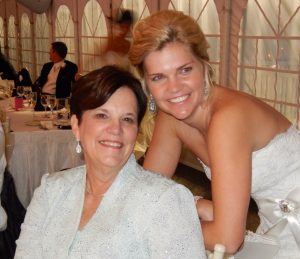 This post is part of the Epilepsy Blog Relay™ which will run from June 1 to June 30, 2017. Follow along!
This post is part of the Epilepsy Blog Relay™ which will run from June 1 to June 30, 2017. Follow along!
For the blog relay this month, I wanted to provide another perspective. By now, you know mine. Epilepsy sucks. It’s a challenge… all. the. time. But, I always try to remember how hard it can be on my family too. Sometimes what they go through is just as difficult.
So, I asked my mom for her perspective. Here it is.
Mom’s Story
“Abby’s declared herself. She has a seizure disorder.” Those words, uttered by the doctor, will forever stay with me. I was devastated. Our precious daughter was diagnosed with epilepsy and we were about to begin a journey that our family had not bargained for. There were countless doctor visits, tons of medical tests, and all different medications used to treat Abby, but nothing seemed to help during those first tumultuous weeks and months after her diagnosis. I felt like our life had been turned upside down.
We had a beautiful, successful teenage daughter who was angry and resentful that she had to deal with epilepsy. As I look back she fought taking her medication and visits to the doctor every step of the way. It was a daily challenge for our family to protect her and keep her safe. I wanted Abby to take her medicine on a regular basis—every twelve hours. I bought every type of pill box, so she would keep the tablets of medicine with her at all times. She would leave the house for a weekend activity and I would find the pill box stashed in her room or the bathroom. She would then suffer another seizure because she missed a dose of medicine. How would we ever help her if she did not cooperate and follow the doctor’s instructions?
Getting Abby through high school was a very difficult time for us. She had break through seizures at night when she was sleeping. I clearly remember one night when we heard Abby fall out of bed. Her dad and I ran into her room, only to find her on the floor in a full-blown seizure. Her eyes rolled back in her head, she was rigid, her teeth were clamped together, and she was shaking uncontrollably. After the seizure was over, we got her back into bed so she could sleep and recover. When we got back in bed, I looked over at my husband and he had tears running down his face. He did not want to talk about it, so we went back to sleep feeling sadness and grief. That was moment I realized that the seizures were affecting both of us.
The seizure disorder affected my husband and me, yes, but is affected her brother, Byron, as well. I recall the day that he had a disagreement with me. He said to me, “You are always helping Abby, but you ignore me.” It was at that moment I realized we were making accommodations for Abby and her epilepsy, but not attending to the needs of her brother. I apologized to him and made a concerted effort to care for his wants and needs as much as I cared for Abby’s.
Another memorable incident occurred while we were at dinner with my extended family—my sisters and nephews. We were at a local restaurant having dinner. Abby was getting her hamburger just the way she wanted it and looked at the ketchup and said, “Please pass the red”. I looked at her terrified and wondered if the seizures were causing word-finding problems. Had we entered another stage in our journey with epilepsy? I knew we needed to find another doctor to see if he could help her.
We did locate a wonderful doctor at Children’s Hospital in St. Louis, and we believed we had found someone who would help us. Even though Abby was resistant and not sure if she liked this particular doctor, her father and I did. This wonderful pediatric neurologist prescribed medicine that did not have as many side effects. She was getting ready to leave for college so we know that we needed a better combination of medicines so she would be able to function in her new environment. She chose to attend Purdue University to my delight since that was my alma mater. Luckily for her father and me, she ended up with a roommate, Kelley, who we saw as an angel from heaven. She seemed to be there whenever Abby’s seizures occurred and always provided her the love and care she needed.
One day when Abby was out of college and in the workplace, I finally saw a more grown up version of our daughter. We were sitting in the living room and she said, “I don’t want to have these seizures anymore. I can’t remember so many events from my past. What do I need to do?” I felt at that moment we crossed an important barrier she had had up for so many years. I replied that it is important to take her medicine regularly, eat a healthy diet and get enough sleep. Those were a few modifications she could make to her lifestyle that would help to change the outcome of her seizure disorder. To my delight she took the advice and began working on her own health, and we saw a significant decrease in her seizures.
There are some long-lasting effects of epilepsy we see today. Abby’s memory of special events or times from high school is gone. I might say, “Remember when we….” and Abby responds in the negative. She, to this day, has no recollection of the events we often discuss as a family. The seizures have erased them from her memory. It makes me sad that she cannot recall special times.
Today, I’m proud to say, we remained close during all of the time we were trying to navigate this difficult seizure disorder. I am happy to tell you that Abby has done well, and we remain a closely-knit family, though it has always been a challenge to find our way through the many trials and tribulations of the epilepsy journey.
 NEXT UP: Be sure to check out the next post tomorrow by Soo at https://soosepilepsycorner.blogspot.com/. For the full schedule of bloggers visit livingwellwithepilepsy.com.
NEXT UP: Be sure to check out the next post tomorrow by Soo at https://soosepilepsycorner.blogspot.com/. For the full schedule of bloggers visit livingwellwithepilepsy.com.
TWITTER CHAT: And don’t miss your chance to connect with bloggers on the #LivingWellChat on June 30 at 7PM ET.









Leave a Reply